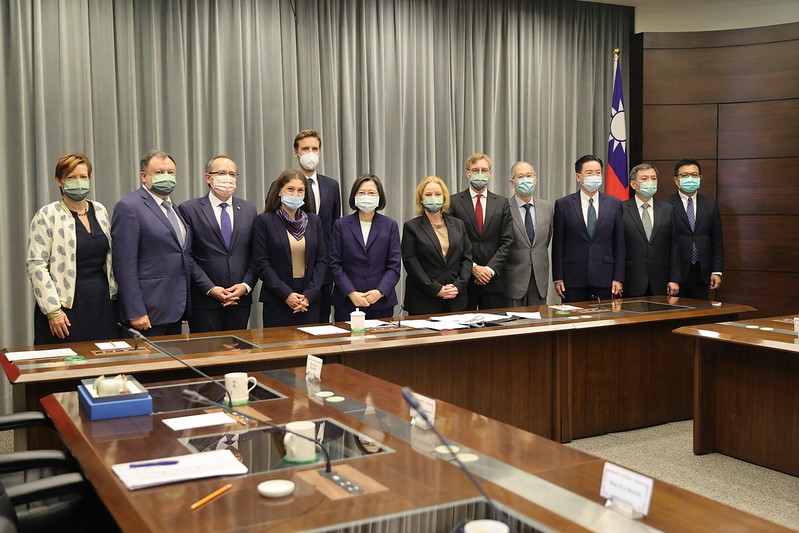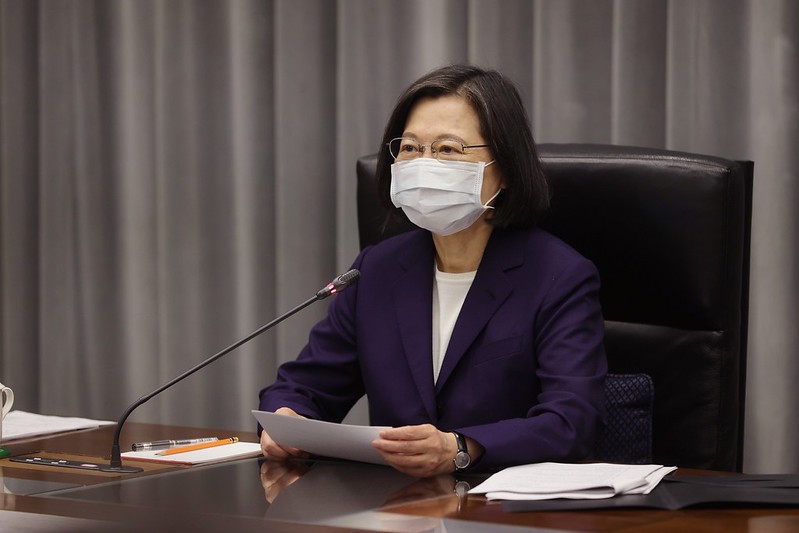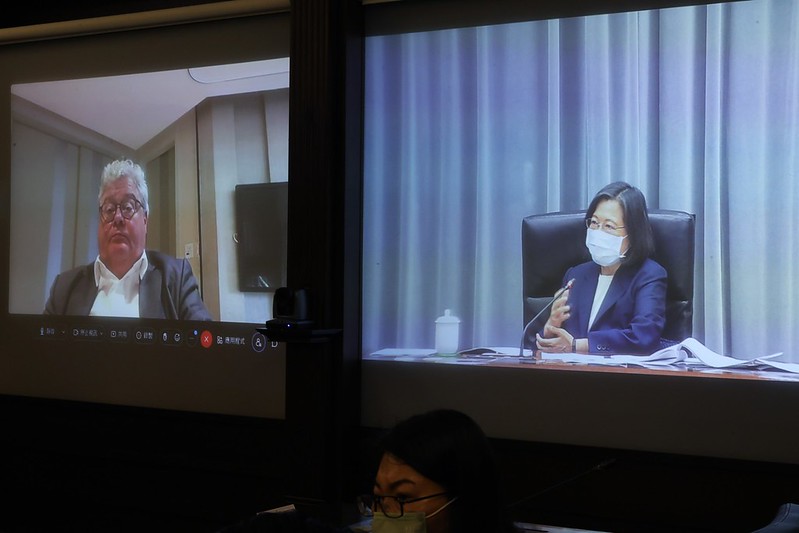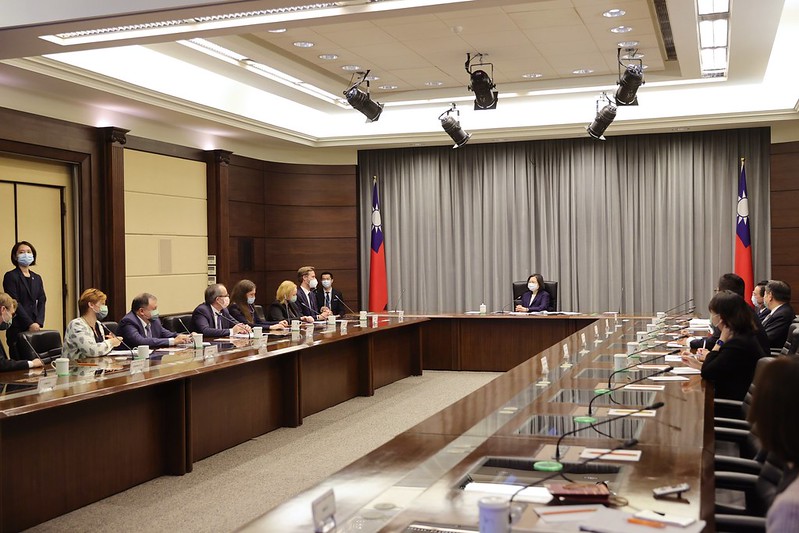News & activities
 News releases
News releases
On the morning of November 3, President Tsai Ing-wen met a delegation from the Inter-Parliamentary Alliance on China (IPAC), and thanked IPAC for its support for Taiwan, which crosses party lines and national borders. The president said that as the democratic world order faces formidable challenges, democratic nations should unite and cooperate to resolutely defend the values of democracy and freedom. She also expressed confidence that Taiwan will continue to deepen cooperation with its democratic allies, channeling the power of solidarity to jointly uphold security across the Taiwan Strait, as well as peace and stability throughout the region.
A translation of President Tsai's remarks follows:
I would like to warmly welcome IPAC Co-Chair Reinhard Bütikofer and the delegation to Taiwan. Although Co-Chair Bütikofer tested positive for COVID-19, he is joining us by videoconference today. I would like to wish him a speedy recovery.
This is the first visit to Taiwan by an IPAC delegation. The fact that your group includes parliamentarians from seven European nations and the European Parliament is highly significant and demonstrates a transnational and cross-party commitment to supporting Taiwan.
In August, China conducted prolonged military exercises, impacting regional peace and stability. During its summit in Washington, DC, in September, IPAC issued a statement stressing the importance of upholding peace and stability across the Taiwan Strait and expressed that IPAC would encourage parliamentarians to visit Taiwan. I am delighted to welcome you all to Taiwan so soon after that summit. I also wish to express my heartfelt gratitude to IPAC for taking concrete action to support Taiwan.
Meanwhile, global supply chains continue to undergo restructuring in the wake of the COVID-19 pandemic and ongoing authoritarian expansion. Taiwan's long history of development in the semiconductor industry has allowed us to gain an advantage in this field. We look forward to creating more secure and resilient global supply chains through mutual investments and technology exchanges with democratic allies.
Here, I would like to convey my special thanks to IPAC for its statement of October 14, which again called on democratic states to increase political and economic engagement with Taiwan, including through bilateral and multilateral trade and investment agreements. I once again thank each of you for your support. I believe that Taiwan and the European Union will indeed continue to deepen our partnership in all areas.
At this moment, the democratic world order is facing formidable challenges, including Russia's invasion of Ukraine and China's protracted military exercises. Such actions lay bare the expansionist ambitions of authoritarian states, which have disrupted and jeopardized the world order. Democratic nations should thus unite and cooperate to resolutely defend our values of democracy and freedom.
Taiwan stands on the frontline against authoritarian expansionism. It is therefore vital that Taiwan enhances its self-defense capabilities and forges closer and stronger links with democratic partners. I once again thank IPAC and all of you for your staunch support for Taiwan. We are confident that Taiwan can continue to deepen cooperation with its democratic allies across the board, channeling the power of solidarity and jointly upholding security across the Taiwan Strait, as well as peace and stability throughout the region. Thank you!
Member of the European Parliament and IPAC Co-Chair Bütikofer then delivered remarks, saying that it is a great honor for their delegation of European legislators from seven different countries to be able to meet with President Tsai. Co-Chair Bütikofer expressed his gratitude for this opportunity to let the delegation better understand the situation in and around Taiwan, and added that this visit will deepen our friendship.
Co-Chair Bütikofer mentioned that IPAC includes parliamentarians from 29 legislatures around the globe who work together in a multi-partisan way to bolster democratic resilience and effective policies to counter the human rights violations, breaches of international law, and hegemonic ambitions of Beijing's totalitarian leadership. He also pointed out that the members of the delegation come from Belgium, the Czech Republic, Kosovo, the Netherlands, Ukraine, the United Kingdom, and Germany, and that they belong to many diverse parties, which exemplifies the EU saying: united in diversity.
Co-Chair Bütikofer stated that IPAC's members may differ on many political issues, but they share the conviction that all democracies must stand together against the global wave of authoritarianism. As IPAC's fundamental strategy is to seek solidarity between democracies, Co-Chair Bütikofer stated that his delegation was in Taiwan to demonstrate solidarity with Taiwan's democracy. He added that supporting Taiwan is a pillar of their work, as stated publicly at IPAC's conference in Washington, DC in September.
Co-Chair Bütikofer explained that the delegation was also in Taiwan for a second reason – to express gratitude from Europe for Taiwan's support for Ukraine in their heroic effort to defend their sovereignty and their internationally recognized borders against the illegal Russian war of aggression. Co-Chair Bütikofer said it is important to note that this war is supported openly by the regime in Beijing. Stating that Taiwan's solidarity has not been forgotten, Co-Chair Bütikofer said that as Taiwan steps up to the plate now, Europeans will step up to the plate when Taiwan needs it.
Co-Chair Bütikofer stated that IPAC's fundamental position on Taiwan is very clear – it stands in solidarity with Taiwan against CCP aggression and in defense of stability and peace, opposes any unilateral change of the status quo across the Taiwan Strait, and deplores the use or threat of force.
Noting that Taiwan and the members of the delegation share many basic values which are under threat today, Co-Chair Bütikofer said that even where we disagree, such as on the death penalty, we communicate respectfully.
Co-Chair Bütikofer stated that IPAC has pledged to help counter China's increasingly aggressive actions against Taiwan with a policy of deterrence, and also wants to strengthen partnerships with Taiwan on all levels, notably in trade and investment. That is why, Co-Chair Bütikofer said, IPAC has called for an EU-Taiwan bilateral investment agreement. He added that IPAC also supports the meaningful participation of Taiwan in international organizations such as the International Civil Aviation Organization, World Health Organization, INTERPOL, and the United Nations Framework Convention on Climate Change.
Co-Chair Bütikofer said that the delegation wishes Taiwan's democracy a strong, proud, vibrant, and flourishing future. He thanked President Tsai and Taiwanese government officials for the treatment afforded to him and the delegation, and expressed his appreciation for the opportunity to deliver remarks. He then wished everyone continued success in our work advancing human rights, social justice, climate responsibility, democracy, and the rule of law.
Member of the Dutch House of Representatives and IPAC Co-Chair Sjoerd Sjoerdsma then spoke, saying it was his honor to be here and expressing gratitude for the hospitality shown to the delegation. He said that the timing of their visit was no coincidence, as it followed the recent Communist Party Congress in Beijing. Co-Chair Sjoerdsma said that the delegation has come to Taiwan to show that Taiwan cannot be isolated, that we cannot be intimidated, and that relations and friendships with Taiwan cannot be determined by others.
Co-Chair Sjoerdsma stated that the world is facing a battle between autocracy and democracy, in which Taiwan is at the frontline. He added that the delegation has come to Taiwan to show that they will provide solidarity no matter what.
Mentioning Co-Chair Bütikofer's earlier comment on opportunities in trade, cyber defense, and other areas, Co-Chair Sjoerdsma expressed his belief that what is most important is that the delegation is in Taiwan to show that lessons have been learned from the Russian invasion of Ukraine.
Co-Chair Sjoerdsma said that we did not manage to deter Russia from its invasion because we did not communicate our resolve, our joint strength, and the political, economic, and military measures we were willing to take in response to such an invasion beforehand, adding that having made this mistake once, we will never make it again.
He explained that in terms of Taiwan, that means it is necessary for democracies to communicate clearly to Beijing that if China is to make any move toward Taiwan, there will be serious political, economic, and military consequences, which will ensure the costs of such a move outweigh the perceived benefits in Beijing.
Co-Chair Sjoerdsma said that a threat to Taiwan is a threat to democracies worldwide, and that he is looking forward to further discussing on these issues.
Also present were UK Member of Parliament Judith Cummins, Member of the Czech Republic Chamber of Deputies Eva Decroix, Member of the Assembly of the Republic of Kosovo Avdullah Hoti, Member of the Verkohvna Rada (parliament) of Ukraine Mykola Kniazhytskyi, and Member of the Belgian Chamber of Representatives Els Van Hoof.












